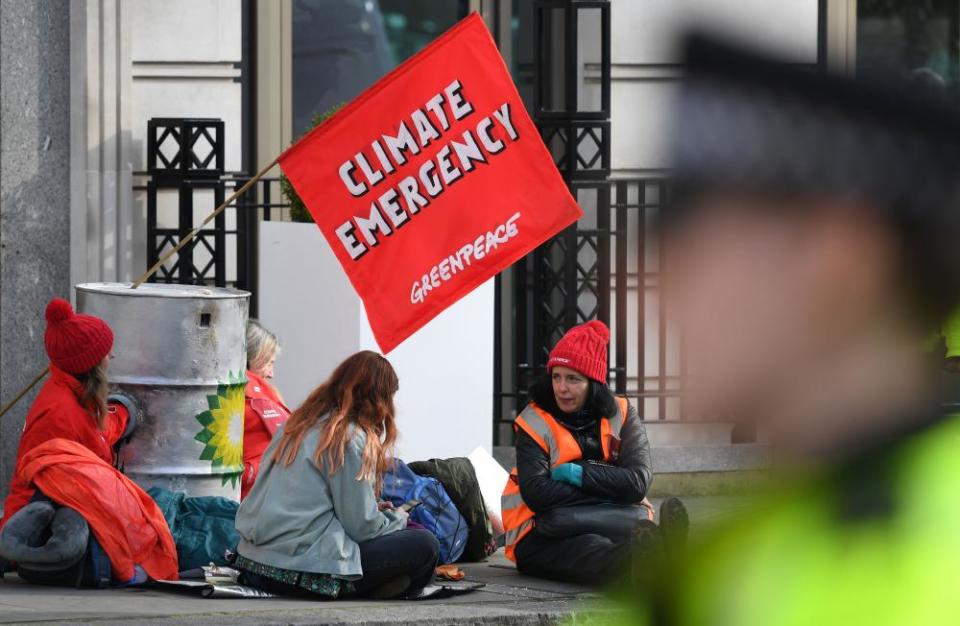BP sets net zero carbon target for 2050
BP’s new chief executive has set an ambition to shrink the oil firm’s carbon footprint to net zero by 2050 and aims to cut the carbon intensity of the products it sells by 50% over the same period.
BP is following the lead of other large oil firms by setting a target to reduce its contribution to the climate crisis by removing more than 400m tonnes of carbon emissions a year.
Related: Revealed: big oil's profits since 1990 total nearly $2tn
Bernard Looney, who replaced Bob Dudley as chief executive this month, said BP would aim to become a net zero company by 2050 or sooner by tackling “all the carbon we get out of the ground as well as all the greenhouse gases we emit from our operations”.
Looney will reveal in September how the group will meet the ambitious targets, and he said he expects BP will “invest more in low-carbon businesses – and less in oil and gas – over time”.
The strategy is likely to include reducing emissions from BP operations and using carbon offsetting measures such as tree-planting.
“It is clear to me and to our stakeholders that for BP to play our part and serve our purpose we have to change. And we want to change – this is the right thing for the world and for BP,” Looney said.
BP’s green goals have divided environmental campaigners. Some welcomed the company’s ambition; others criticised the absence of a clear strategy.
Murray Worthy, a senior campaigner at Global Witness, said BP’s net zero pledge “looks like an attempt to grab some positive headlines by a new CEO but with little of substance to show how it will achieve these grand claims.
“There is nothing ambitious about a plan that is simply not credible. Saying that they will invest more in low-carbon tech and less in oil and gas ‘over time’ is not a credible plan for reaching net zero. The science is clear that this shift has to happen immediately.”
The ambitions were welcomed by Climate Action 100+, the Institutional Investors Group on Climate Change (IIGCC) and the Church of England Commissioners, which have all collaborated with BP’s executives to help tackle the climate crisis.
Stephanie Pfeifer, a member of Climate Action 100+ and the chief executive of the IIGCC, said investors would continue to look for progress from BP including how it would invest more in non-oil and gas businesses and ensure its lobbying activity supports delivery of the Paris agreement.
Looney told investors the company plans to keep growing its cashflows and shareholder distributions over the long term, raising concerns over whether it will reduce the amount of oil and gas that it produces.
An investigation by the Guardian last year revealed that the company planned to grow its production of oil and gas by about a fifth between 2018 and 2030, despite warnings that an increase in fossil fuel production would put the world on track for catastrophic global heating and a runaway climate crisis.

Looney said: “We all want energy that is reliable and affordable but that is no longer enough. It must also be cleaner. To deliver that, trillions of dollars will need to be invested in replumbing and rewiring the world’s energy system.
“It will require nothing short of reimagining energy as we know it. This will certainly be a challenge but also a tremendous opportunity.”
BP said it aimed to play a more active role in lobbying for policies that would spur climate action, and cut its spending on corporate reputational sponsorship and redirect the funds towards promoting climate action.
The company has faced growing public protests over its sponsorship of the arts in recent months. This month the Guardian became the first major global news organisation to ban advertising from fossil fuel companies.
Looney set out the plans for a greener BP alongside an overhaul of the company, under a new leadership team. The shakeup will involve four new business areas: production and operations, customers and products, gas and low-carbon energy, and innovation and engineering.
Helge Lund, the chairman, said: “The board supports Bernard and his new leadership team’s ambition for BP. Aiming for net zero is not only the right thing for BP, it is the right thing for our shareholders and for society more broadly.
“As we embark on this ambitious agenda, we will maintain a strong focus on safe, reliable and efficient operations and on delivering the promises we have made to our investors.”

 Yahoo Finance
Yahoo Finance 